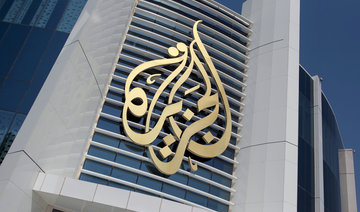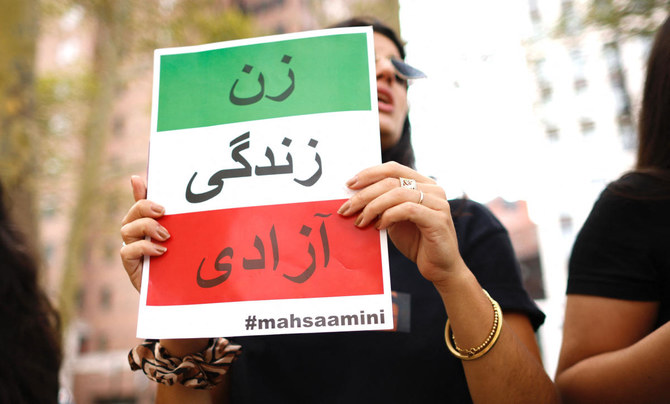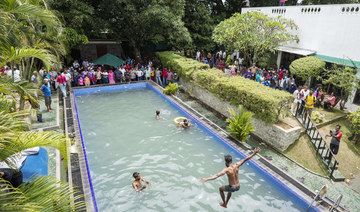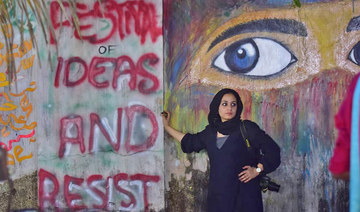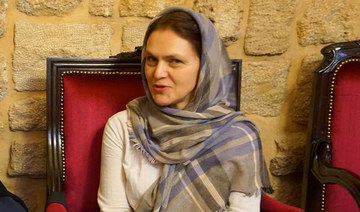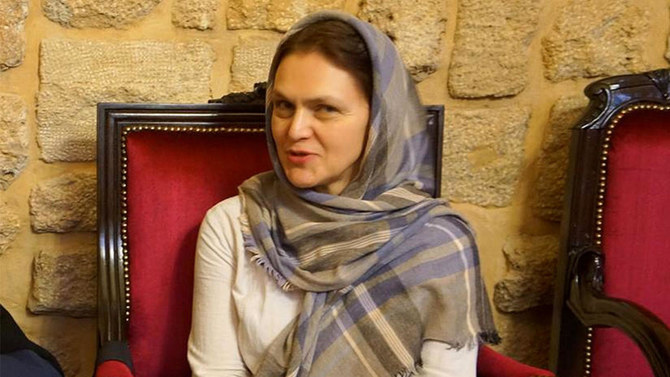LONDON: Following the list of 13 demands that were presented to Qatar on June 23 from four Arab states, media commentators have been focusing on one in particular — that Qatar must terminate its Al Jazeera TV network.
Interestingly though, the perceptions of the network have morphed over the past few weeks from villain to victim — with many fellow journalists coming out in Al Jazeera’s defense, ignoring what some see as the highly questionable terror-related content the Doha-based network has been infamous for.
The broadcaster — which opened in 1996 as an Arabic channel, followed by its English-language service in 2006 — has found itself at the center of a media storm since the demands were delivered, with titles such as The New York Times defending its right to exist, forgetting that it too has been critical of the channel for the very same reasons that are being raised by Qatar’s Gulf neighbors today.
For its part, Al Jazeera has launched a campaign entitled “We too have demands,” and is using every opportunity to position what is going on as an attack on press freedom.
Amid the media storm, it may easily be forgotten that not everyone has been such a fervent supporter of the network, with many media outlets and politicians pointing to Al Jazeera’s alleged sympathy toward terror groups in the past.
With the clock ticking on its fate, here is how Al Jazeera has been received over the years — and how some of those who criticized it in the past are defending it today:
The New York Times
NOW: June 2017. The newspaper’s editorial board recently wrote: “Al Jazeera is hardly a perfect news organization: Critical reporting on Qatar or members of Qatar’s royal family is not tolerated. But much of the rest of its reporting hews to international journalistic standards, provides a unique view on events in the Middle East and serves as a vital news source for millions who live under anti-democratic rule. Those are reasons enough for the monarchs and dictators attacking Qatar to silence Al Jazeera. And reason enough to condemn their action.”
THEN: November 2001. Two months after Al-Qaeda’s 9/11 attacks on the US, Fouad Ajami, a Lebanese-born American scholar, analyzed Al Jazeera in the New York Times Magazine. He wrote that Al Jazeera “may not officially be the Osama bin Laden Channel, but he is clearly its star... A huge, glamorous poster of bin Laden’s silhouette hangs in the background of the main studio set at Al Jazeera’s headquarters in Doha, the capital city of Qatar… The Hollywoodization of news is indulged with an abandon that would make the Fox News Channel blush. The channel’s promos are particularly shameless. One clip juxtaposes a scowling George Bush with a poised, almost dreamy bin Laden; between them is an image of the World Trade Center engulfed in flames.”
The Washington Times
NOW: June 2017. An editorial piece published on June 27 had this to say of the demand to close Al Jazeera: “You may like the content offered on Al Jazeera. You may not. You may not be familiar with it at all. But regardless, you surely support the concept of a free and open media delivering its message to the broadcast world… For a foreign nation or nations to hold another hostage, however, to literally blackmail them into pulling the plug on a worldwide broadcast or else face economic destruction, that’s an act of war. Perhaps more importantly, it is an act directly opposed to the freedoms we cherish in America and which we attempt to export everywhere.”
THEN: October 2013. An opinion piece took aim at Al Jazeera in 2013, with Christopher Harper writing: “Everyone should know where (Al Jazeera America) stands — right under the thumb of the Qatari princes. The agenda is to get a seat at the political table through the network, which aims at focusing mainly on the failures of the United States rather than its successes, with a bias now made plain for all to see.”
Turkish President Recep Tayyip Erdogan
NOW: June 2017. Turkish President Recep Tayyip Erdogan has weighed into the debate on Al Jazeera, saying of the demands on Qatar that the ultimatum is “against international law.” He added: “We welcome (Qatar’s position) because we consider the 13-point list against international law.”
THEN: Some have commented that there is a certain irony in Erdogan standing up for Al Jazeera, given that Turkey reportedly has more journalists in its prisons than any other nation. According to the Committee to Protect Journalists, Turkey accounted for a third of all journalists imprisoned worldwide in 2016. Erdogan insists that those locked up are all “terrorists.” The Al Jazeera Türk website was shut down in May 2017, in a move attributed to staffing optimization.
The US administration
NOW: June 2017. US Secretary of State Rex Tillerson, in his first public comments about the ultimatum issued against Qatar, said that “some of the elements will be very difficult for Qatar to meet,” although he did not specify anything about Al Jazeera.  One of his predecessors, Hillary Clinton, praised Al Jazeera in 2011, when the US administration supported the Arab Spring. In what marked a sharp U-turn from the stance of the previous administration over Al Jazeera, Clinton told members of the US Senate Foreign Relations Committee: “You’ve got a global — a set of global networks — that Al Jazeera has been the leader in, that are literally changing people’s minds and attitudes…Viewership of Al Jazeera is going up in the United States because it’s real news.”
One of his predecessors, Hillary Clinton, praised Al Jazeera in 2011, when the US administration supported the Arab Spring. In what marked a sharp U-turn from the stance of the previous administration over Al Jazeera, Clinton told members of the US Senate Foreign Relations Committee: “You’ve got a global — a set of global networks — that Al Jazeera has been the leader in, that are literally changing people’s minds and attitudes…Viewership of Al Jazeera is going up in the United States because it’s real news.”
THEN: Al Jazeera was reportedly nicknamed the “terror network” by the administration of George W. Bush. The former US president allegedly discussed bombing the offices of Al Jazeera in 2005, leading senior channel management to seek a meeting with the then-UK Prime Minister Tony Blair.
OTHER MEDIA ON AL JAZEERA
Fox News
THEN: February 2011. Former Fox News host Bill O’Reilly, interviewing Alan Colmes (a Fox News contributor), said in 2011 that the Qatari broadcaster is “an anti-Semitic, anti-American network.”  He added: “It doesn’t come any more anti-Semitic than Al Jazeera.” O’Reilly then told Colmes — a Jewish man — that “they would do violence to you.”
He added: “It doesn’t come any more anti-Semitic than Al Jazeera.” O’Reilly then told Colmes — a Jewish man — that “they would do violence to you.”
MSNBC’s Morning Joe
NOW: June 2017. Host Joe Scarborough, a former member of the US House of Representatives, was speaking about the diplomatic row in the Gulf, when he quipped: “You’ve got the Saudis, the UAE, Israel, a lot of people correctly saying (that) Qatar has been funding terrorist organizations, Hezbollah, they’ve been funding radical aspects of the Muslim Brotherhood, they have been spreading disinformation… Through Al Jazeera… What the Saudis and the UAE (were) saying to them for years (was) ‘why are you glorifying Osama Bin Laden? Why are our children turning on the TV set and seeing these wonderful documentaries about Osama Bin Laden, the guy who’s trying to kill us?’ So it’s not as if the UAE and the Saudis don’t have a point here.”
Through Al Jazeera… What the Saudis and the UAE (were) saying to them for years (was) ‘why are you glorifying Osama Bin Laden? Why are our children turning on the TV set and seeing these wonderful documentaries about Osama Bin Laden, the guy who’s trying to kill us?’ So it’s not as if the UAE and the Saudis don’t have a point here.”
Der Spiegel
THEN: February 2013. German newspaper Der Speigel published an article titled “Al-Jazeera Losing Battle for Independence,” in which the reporters claimed that Al Jazeera “has a problem: More than ever before, critics contend that the broadcaster is following a clear political agenda, and not adhering to the principles of journalistic independence...  the Arab programming of Al-Jazeera — which means ‘the island’ in Arabic — was launched in 1996 with a noble goal: It aimed to serve as an objective medium in a world of rigorous censorship. The network broadcast messages from Osama bin Laden, prompting outraged criticism from the US, where it was referred to as a ‘terror network’.”
the Arab programming of Al-Jazeera — which means ‘the island’ in Arabic — was launched in 1996 with a noble goal: It aimed to serve as an objective medium in a world of rigorous censorship. The network broadcast messages from Osama bin Laden, prompting outraged criticism from the US, where it was referred to as a ‘terror network’.”



